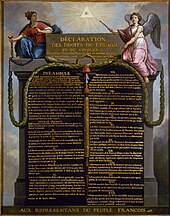
Back Religionsfreiheit ALS حرية الاعتقاد Arabic حرية العقيده ARZ Llibertá de cultu AST دین اؤزگورلوگو AZB Свабода веравызнання Byelorussian Свобода на вероизповеданието Bulgarian ধর্মীয় স্বাধীনতা Bengali/Bangla ཆོས་དད་རང་མོས། Tibetan Sloboda vjere ili uvjerenja BS
| Freedom of religion |
|---|
| Religion portal |
| Part of a series on |
| Liberalism |
|---|
 |

Freedom of religion or religious liberty, also known as freedom of religion or belief (FoRB), is a principle that supports the freedom of an individual or community, in public or private, to manifest religion or belief in teaching, practice, worship, and observance. It also includes the right not to profess any religion or belief[1] or "not to practise a religion" (often called freedom from religion).[2]
The concept of religious liberty includes, and some say requires, secular liberalism, and excludes authoritarian versions of secularism.[3][4][5]
Freedom of religion is considered by many people and most nations to be a fundamental human right.[6][7] Freedom of religion is protected in all the most important international human rights conventions, such as the United Nations International Covenant on Civil and Political Rights, the American Convention on Human Rights, the European Convention on Human Rights, and the United Nations Convention on the Rights of the Child. In a country with a state religion, freedom of religion is generally considered to mean that the government permits religious practices of other communities besides the state religion, and does not persecute believers in other faiths or those who have no faith; in other countries, freedom of religion includes the right to refuse to support, by taxes or otherwise, a state religion.[citation needed]
Freedom of religion includes, at a minimum, freedom of belief (the right to believe whatever a person, group, or religion wishes, including all forms of irreligion, such as atheism, humanism, existentialism, or other forms of non-belief), but some feel freedom of religion must include freedom of practice (the right to practice a religion or belief openly and outwardly in a public manner, including the right not to practice any religion).[8] A third term, freedom of worship, may be considered synonymous with both freedom of belief and freedom of practice or may be considered to fall between the two terms.
Crucial in the consideration of religious liberty is the question of whether religious practices and religiously motivated actions that would otherwise violate secular law should be permitted due to the safeguarding freedom of religion. This issue is addressed in numerous court cases including the United States Supreme Court cases Reynolds v. United States and Wisconsin v. Yoder and in the European law cases of S.A.S. v. France, as well as numerous other jurisdictions.
Symbols of religious freedom are seen in significant locations around the world, such as the Statue of Liberty in New York, representing hope for religious refugees;[9] the Touro Synagogue in Rhode Island, reflecting America's early commitment to religious tolerance;[10] and the Golden Temple in Amritsar, India, a symbol of religious inclusivity and freedom of worship.[11] Other key sites include the Bahá'í Gardens in Haifa, Israel, which emphasize the unity of humanity and freedom of belief,[12] and Lutherstadt Wittenberg in Germany, where Martin Luther's actions sparked the Reformation, symbolizing a fight for religious reform and liberty.[13]
- ^ "CCPR General Comment No. 22: Article 18 (Freedom of Thought, Conscience or Religion)". 30 July 1993 – via https://refworld.org.
5. The Committee observes that the freedom to 'have or to adopt' a religion or belief necessarily entails the freedom to choose a religion or belief, including the right to replace one's current religion or belief with another or to adopt atheistic views. [...]
{{cite web}}: External link in|via= - ^ "CASE OF BUSCARINI AND OTHERS v. SAN MARINO". European Court of Human Rights. 18 February 1999. § 34. Retrieved 24 January 2023..
- ^ Andrew Koppelman, How could religious liberty be a human right?, International Journal of Constitutional Law, Volume 16, Issue 3, July 2018, Pages 985–1005, https://doi.org/10.1093/icon/moy071
- ^ "Is the liberal state secular? How much state-religion separation is necessary to secure liberal-democratic ideals". Religion and Global Society. 5 April 2017. Retrieved 7 March 2024.
- ^ Rosentiel, Tom (3 December 2007). "Religion and Secularism: The American Experience". Pew Research Center. Retrieved 7 March 2024.
- ^ Davis, Derek H. "The Evolution of Religious Liberty as a Universal Human Right". Archived from the original on 1 February 2008. Retrieved 5 December 2006.
- ^ Congress, U. S. (2008). Congressional Record #29734 – 19 November 2003. U.S. Government Printing Office. ISBN 978-0160799563. Retrieved 3 September 2011.
- ^ Cite error: The named reference
Farr2019was invoked but never defined (see the help page). - ^ "The story behind 'The New Colossus' poem on the Statue of Liberty and how it became a symbol of immigration". ABC News. Retrieved 13 September 2024.
- ^ "Touro Synagogue — the country's oldest synagogue — sees increase in visitors, both Jewish and non-Jewish, coming to reflect - The Boston Globe". BostonGlobe.com. Retrieved 13 September 2024.
- ^ Heim, Kristi (16 August 2009). "Visitors find a lot to worship in India's historic, friendly Amritsar". The Seattle Times. Retrieved 13 September 2024.
- ^ "PEOPLE: Religious Freedom". embassies.gov.il. Retrieved 13 September 2024.
- ^ Hawkins, Benjamin (31 October 2020). "Luther's 500-year-old 'On Christian Liberty' lays foundation for modern religious freedom". Pathway. Retrieved 13 September 2024.